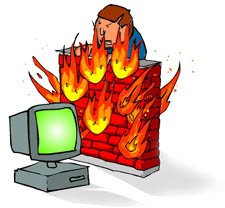Defence mechanisms
In order to avoid computer attacks, or at least limit their consequences, countermeasures must be taken: calculators and networks need protection. The only hacker-proof computer is the one which is switched off, not connected to Internet and locked up in a safe. But that is not enough; it is safe as long as it is switched off, but as soon as you switch it on again it is vulnerable and can be attacked during the installation of any updates to the operating system or while it is downloading details of the "signatures" of new viruses or worms which have appeared on Internet while it was switched off. Although these operations take only a short time, a few minutes at most, the chance of being subjected to intrusion through the network in this lapse of time must be taken seriously, and in some particularly "dirty" networks it is almost a certainty. Absolute safety is not possible, as in any environment, but tools have been developed to limit the risks and allow an appropriate level of security to be maintained.
Above all, it is very important to continuously update both the operating system
and the application programmes by installing special programmes ("updates"),
especially those relating to security. By doing this,
you protect your computer from the weaknesses which are identified and which
will sooner or later be exploited by some attacking mechanism computers must be
cared for properly; the owner must know exactly what he is doing in order to
reduce to the minimum the risk of having "doors" open to possible interference.
You should not use obvious passwords (those which can be easily guessed) and it
is advisable to limit as much as possible the use of any services which a
computer offers its users (e.g.
web server
As far as
viruses are concerned, it is a good idea to use "antivirus" programmes that can
identify and often remove (or at least render inoffensive) the large majority of
viruses circulating on-line. To do this, however, special tables containing the
"digital fingerprints" of the viruses themselves must be updated very
frequently, so they can be identified. Apart from protecting individual computers, you can also protect entire networks
of computers using other more sophisticated instruments based on the control of
the traffic packets entering the local network, such as
"firewall
However, firewalls cannot solve the problem of "insiders", i.e. attacks by those
working within the local network of an organisation. In fact, internal hackers
do not need to cross the "safety-zone" created by the firewall. Intrusion
detection systems are used especially for this purpose, as well as for
identifying attacks from outside. They can be considered to be almost complementary to the firewalls. These systems
(IDS![]() ,
daemon
,
daemon![]() for
various functions, shared disk partitions available to anonymous users, etc).
for
various functions, shared disk partitions available to anonymous users, etc).

![]() "
and mechanisms to detect intrusions ("Intrusion Detection/Prevention Systems". Firewalls are protection systems that include both software applications and
hardware modules, i.e. network devices. Their job is to control and limit the
flow of packets between the network which you want to protect (typically a
private local network (
LAN
"
and mechanisms to detect intrusions ("Intrusion Detection/Prevention Systems". Firewalls are protection systems that include both software applications and
hardware modules, i.e. network devices. Their job is to control and limit the
flow of packets between the network which you want to protect (typically a
private local network (
LAN![]() ) often
called intranet, and the rest of the world, considered hostile. From a security
point of view, Internet is considered as an absolutely insecure and unknown
virtual place.
) often
called intranet, and the rest of the world, considered hostile. From a security
point of view, Internet is considered as an absolutely insecure and unknown
virtual place.
Located at the point of contact between Internet and the network of a specific
organisation, the firewall filters the traffic and prevents access to packets
considered as dangerous on the base of certain security rules; it can also check
(and therefore allow through or block) the type of connections established
between computers which communicate between the inside and the outside of the
firewall itself (as with, for example,
"telnet

![]() "remote
connections). There are also simpler firewalls ("personal firewalls") that are
used to protect one single calculator.
"remote
connections). There are also simpler firewalls ("personal firewalls") that are
used to protect one single calculator.![]() )
highlight activities suspected to be intrusions, or an unusual use of the
network, and even though they cannot directly stop an attack they can activate
alarms in real time. The IDS can act either at a network-based level or on a
single computer (host-based), and they detect specific and known attack
techniques. In the first case, sensors intercept and analyse the packets going
through the LAN and they can identify attacks of
Denial of Service
)
highlight activities suspected to be intrusions, or an unusual use of the
network, and even though they cannot directly stop an attack they can activate
alarms in real time. The IDS can act either at a network-based level or on a
single computer (host-based), and they detect specific and known attack
techniques. In the first case, sensors intercept and analyse the packets going
through the LAN and they can identify attacks of
Denial of Service![]() or attacks with particular destructive loads
(payload
or attacks with particular destructive loads
(payload![]() ).
In the host-based case, the activity of specific computers is analysed by
examining particular system files (log, audit). It is therefore possible to keep
a check on specific activities such as the sequence of logons/logoffs, attempts
to modify reserved
operating system
).
In the host-based case, the activity of specific computers is analysed by
examining particular system files (log, audit). It is therefore possible to keep
a check on specific activities such as the sequence of logons/logoffs, attempts
to modify reserved
operating system![]() ,
and the use of particular programmes.
,
and the use of particular programmes.